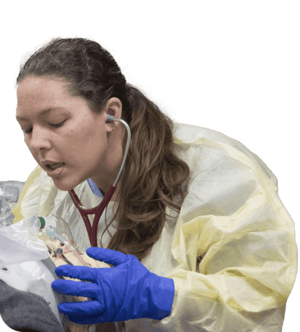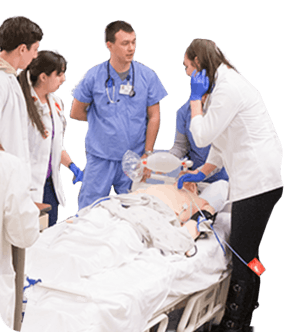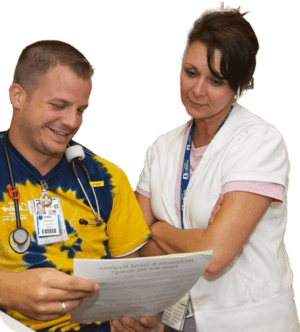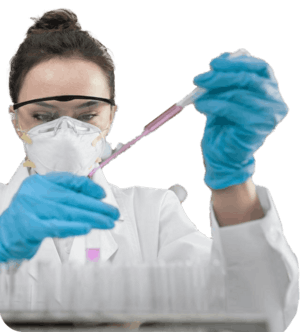Akron Cooperative Medical Laboratory Science Program
The Akron Cooperative Medical Laboratory Science Program (ACMLSP or MLS Program) is a collaborative effort between Akron Children’s, Aultman Health Foundation and Summa Health. In keeping with each institution’s dedication to professional education for allied health professionals, the Akron Cooperative Medical Laboratory Science Program is committed to quality education and clinical training of students in Medical Laboratory Science. Recognizing this important role in diagnosis and treatment of disease, the program promotes advancement of science and technology in patient care through life-long development of technical skills and competency.
MLS Program Accreditation
The Akron Cooperative Medical Laboratory Science Program is accredited by the National Accrediting Agency for Clinical Laboratory Sciences (NAACLS). Accreditation information is available by contacting NAACLS at:
NAACLS
5600 N. River Rd
Suite 720
Rosemont, IL, 60018-5119
Phone: 773-714-8880
Fax: 773-714-8886
Email: info@naacls.org
Outcomes Measures
| Year | Graduation Rate | Attrition Rate | Job Placement | Board of Certification First Year Pass Rate |
| 2022 | 100% | 0% | 100% | 61% |
| 2023 | 93% | 7% | 100% | 100% |
| 2024 | 100% | 0% | 100% | 94% |
Please note: 2024 data is incomplete and will include data through July 11, 2025.
Tuition for 4+1 students (those with a bachelor’s degree prior to program admission) is $8,700, payable in two installments in August and February of the academic year. Tuition is subject to change annually.
Tuition for 3+1 students (those who are completing the final year of their bachelor’s degree at the MLS Program through an affiliated university) will continue to pay tuition to the university. The MLS Program has agreements with university affiliates for tuition payment to the MLS Program by the university directly.
Additional fees for textbooks, professional society dues, and liability insurance are subject to change. Please email MLSProgram@akronchildrens.org for current information.
Employment Opportunities
The current demand for Medical Laboratory Scientists is high in the Akron and surrounding area. In past years, our graduates were able to obtain jobs within 6 months of graduation. Due to the current shortage of qualified laboratory professionals, graduates are hired for laboratory positions prior to graduation, many of them as early as February.
As many laboratory professionals retire in the next 5 years, the demand will continue to increase. Many of our graduates are in leadership and management positions much sooner than expected because of this exodus. We encourage you to consider Medical Laboratory Science as a career choice that will offer stability, opportunity for advancement, and competitive wages and benefits. It is truly a rewarding profession!
Applicants must fulfill the following to be considered for the program:
- Prerequisite courses
- Chemistry – 16 semester hours or 24 quarter hours. To include Organic and/or Biochemistry. A separate course in Biochemistry is strongly recommended.
- Biology – 16 semester hours or 24 quarter hours. To include Microbiology, Immunology, Anatomy/Physiology, and Genetics/Molecular Biology.
- Mathematics – one college-level statistics course. Remedial courses do not meet this requirement.
- Chemistry and Biology courses must be acceptable toward a major in either Chemistry or Biology, or a major in Medical Laboratory Science. Survey courses do not meet these requirements.
- Completion of at least 3 years of college credit totaling at least 90 semester hours or 135 quarter hours. The candidate must be eligible for a bachelor’s degree upon completion of the MLS Program.
- A minimum overall Grade Point Average (GPA) of 2.70 with a minimum combined Chemistry/Biology GPA of 2.5.
- Recommended elective courses include Parasitology, Instrumentation, Quantitative Analysis, Physics, Management and/or Education, and Computer Science.
- The applicant must complete all required pre-professional university/college courses before beginning the MLS Program.
- Degrees and credentials from institutions outside the United States must be evaluated by an agency approved by the American Society for Clinical Pathology. The agency must provide a report to the MLS Program listing the courses taken and the United States equivalent grade. An original or emailed copy of this report must accompany application materials. A list of ASCP approved agencies can be found at www.ASCP.org/boc.
- No persons will be denied admittance to the MLS Program based on race, religion, creed, color, national origin, age, or sex; nor will any otherwise qualified handicapped individual be denied admittance to the MLS Program solely by reason of the handicap.
Essential Functions for Admittance
The Essential Functions (non-academic) established by this program are those functions that the student must be able to accomplish to engage in the education and training activities in a manner that allows progress in the curriculum, and will not endanger other health care workers, trainees, or the public, including patients. Reasonable accommodations will be made, providing they will not endanger the health and safety of others.
| STANDARD | FUNCTION |
| Vision | The student must be able to read charts and graphs, read instrument scales, discriminate colors, view microscopic materials, and record results. |
| Speech and Hearing | The student must be able to communicate effectively and sensitively to elicit information, be able to assess non-verbal communication, and be able to adequately transmit information to all members of the health care team without violating privacy laws. |
| Motor Functions | The student must possess the dexterity and hand-eye coordination necessary to carry out clinical laboratory procedures, manipulate tools, instruments, and equipment. |
| Professional Skills | The student must be able to work independently, manage time efficiently, and comprehend, analyze, and synthesize various information and/or materials. |
| Psychological Stability | The student must possess the emotional health required for full utilization of the applicant’s intellectual abilities and be able to recognize emergency situations and take appropriate action. |
The program is committed to:
- Providing an educational experience that will enable a student to acquire competencies needed to function in any clinical laboratory setting within a standard period of orientation.
- Providing guided experience in scientific investigation and innovation to stimulate curiosity and intellectual growth.
- Developing the student’s understanding, skills, and attitudes for effective cooperation with other health care professionals.
- Providing an environment conducive to professional growth and development, with emphasis on quality care and patient safety.
- Preparing graduates to pass a national certification examination in order to enter professional practice.
| Program Officials: |
Tracy Frankowski, MHA, MLS(ASCP)cm Mary A. Garchar, MLS(ASCP)cm, QLScm Jennifer Cage, MLS(ASCAP)cm |
| Address: |
Akron Children's |
| Phone: | 330-543-8720 |
| Hours: | 8:30 a.m.-3:30 p.m. |
The MLS Program year runs from July to July the following year. MLS Program policies regarding tuition refunds, program withdrawal, academic advisement, confidentiality, grievances, criteria for program completion, academic probation/suspension/dismissal, and service work, and explanation of program structure and current academic calendar may be requested by emailing MLSProgram@akronchildrens.org.
Deadline for applying to the program is December 1 for the class beginning in July of the following year.
2025 Application deadline has been extended until Feb.1, 2025, or until 20 students have been admitted, whichever comes first.
Please download these resources:
- Application Instructions
- Application form
- Reference form
- Undergraduate courses in progress form
MLS Program officials prefer that application materials, except for payment, are emailed to MLSProgram@akronchildrens.org.
Application fee is $45, nonrefundable. Payment must be in the form of personal check or cashier’s check made payable to Akron Cooperative Medical Laboratory Science Program. Please send payment using the United States Postal Service to:
Akron Cooperative MLS Program
Akron Children’s
One Perkins Square, Room 4504 Main Building
Akron, Ohio 44308
The applicant’s eligibility for interview for the MLS Program is determined by a scored evaluation that considers college or university affiliation, grade achievement and trends, courses completed, prior work or volunteer experience, knowledge of the profession, communication skills, personal goals, and reference information.
The interview typically occurs between October and December and is scored using highly structured, predetermined questions. Program officials evaluate traits such as interest, attitude, communication skills, presence of goals, knowledge of the profession, ability to handle stress, sense of responsibility, and problem-solving/decision-making skills. The interview score is combined with pre-interview data for a final applicant score.
The top-ranking students are offered positions in the MLS Program. Up to 10 positions for a class of 20 students may be offered immediately upon completion of the interview if the overall scores meet predetermined requirements. Program officials reserve the right to extend immediate offers to more individuals meeting all criteria. An alternate list is prepared from the next highest scores; offers will be made to alternates upon declination from the original group of offers.
Applications are accepted year-round and will not be evaluated until all requested information and the application fee is received. The applicant is responsible for ensuring that all materials are received at the MLS Program.
The Akron Cooperative Medical Technology Program is proudly affiliated with these universities:
- Ashland University
- The University of Akron
- Bowling Green State University
- Commonwealth University of Pennsylvania
- Kent State University
- Malone University
- Miami University
- University of Mount Union
- Youngstown State University
Preference is given to students from affiliated universities, although applications will be accepted from students attending non-affiliated colleges or universities. A full year of academic credit is granted by the affiliated and nonaffiliated institutions to students enrolled in the MLS Program, so that a 3+1 graduate will receive a bachelor’s degree at the next scheduled college/university commencement following their graduation from the MLS Program.
Undergraduates from non-affiliated institutions must have a statement from the degree-granting institution certifying that it will award a degree at the completion of the MLS Program, according to the standards of the National Accrediting Agency for Clinical Laboratory Science.
Students who have already earned a bachelor’s degree are considered nonaffiliates and receive 32 credit hours of instruction from the MLS Program. All graduates receive a certificate upon completion of the clinical year coursework.
Graduates of the MLS Program are eligible to take the national certification examination offered by the American Society for Clinical Pathology Board of Certification (ASCP-BOC). More information regarding this examination can be found at ASCP.org.
Clinical Sites
The Akron Cooperative Medical Laboratory Science Program is proudly affiliated with these clinical sites:
- Akron Children’s Akron Campus
- Akron Children’s Mahoning Valley Campus
- Aultman Alliance Community Hospital
- Aultman Health Foundation
- Bon Secours Mercy Health (Youngstown, Boardman, Warren)
- Summa Akron Campus
- Summa Barberton Campus
- Summa Wadsworth-Rittman Medical Center
- Summa Lake Medina Medical Center
- Summa Green Medical Center
- Wooster Community Hospital
These clinical sites provide hands-on experience with current instruments, methods, and technology. These sites set the ACMLSP apart from other MLS Programs because of the diversity of clinical experiences available. Our clinical sites include large adult hospitals, a large pediatric hospital, smaller community hospitals, stand-alone emergency department laboratories, a network of patient service centers, and cover a 5-county area (Mahoning, Medina, Stark, Summit and Wayne).
In addition, MLS Program students are offered an elective week to explore non-hospital laboratories, or other specialties such as electron microscopy, cytogenetics, histology, or cytology.
Courses consist of theory, practice and interpretation of diagnostic procedures employed in the clinical laboratory, including operation and management of the laboratory and supervision of personnel. Clinical decision-making skills are developed by correlating laboratory data with disease states.
Clinical Bacteriology - Theory and laboratory methods, including molecular diagnostics, are correlated with isolation and identification protocols for clinically significant bacteria. Pathogenesis and epidemiology of bacterial infections are included.
Clinical Mycology - Theory and laboratory exercises related to identification, etiology, epidemiology, pathogenesis and immunology of mycotic disease.
Clinical Parasitology - Theory and laboratory procedures related to the morphology and life cycles of human parasites.
Immunohematology - Study of human blood groups, compatibility testing, detection and identification of antibodies, transfusion therapy and management of a transfusion service.
Clinical Immunology - Theory and laboratory procedures related to the formation and detection of antibodies and cellular changes in various diseases. Includes flow cytometry and molecular diagnostics.
Clinical Hematology - Study of development of the cellular elements of blood and bone marrow with emphasis on recognition of normal and abnormal elements. Includes lectures on detection of blood dyscrasias, hematological procedures, and cytology and morphology of body fluids with the clinical correlation of laboratory results to diseases.
Coagulation - Theory of coagulation mechanisms and their relationship to disease states, with emphasis on identification of coagulation deficiencies and abnormalities.
Clinical Chemistry - Theory and clinical laboratory experience involving the analysis of chemical constituents of blood and body fluids in normal and disease states.
Urinalysis/Body Fluids - Physiology of the urinary system and related diseases with emphasis on detection methods for chemical and cellular elements of urine. The course includes a review of body fluid analyses of cerebral spinal fluid, synovial fluid, miscellaneous body fluids and fecal analysis.
Molecular Diagnostics - Theory and laboratory methods designed to handle and analyze nucleic acids (DNA and RNA).
Laboratory Management and Operations - Theory and discussion of critical thinking, effective communication, management principles, laboratory information systems, QC and QA, financial management, research, professionalism, credentialing, regulatory agencies, problem solving, team building, presentation skills, technical procedure writing and human resource management.
Special Topics - Examples include Histology, Cytogenetics, Virology, Molecular Diagnostics and Electron Microscopy.
The Akron Cooperative Medical Laboratory Science Program (ACMLSP or MLS Program) is a collaborative effort between Akron Children’s, Aultman Health Foundation and Summa Health.














